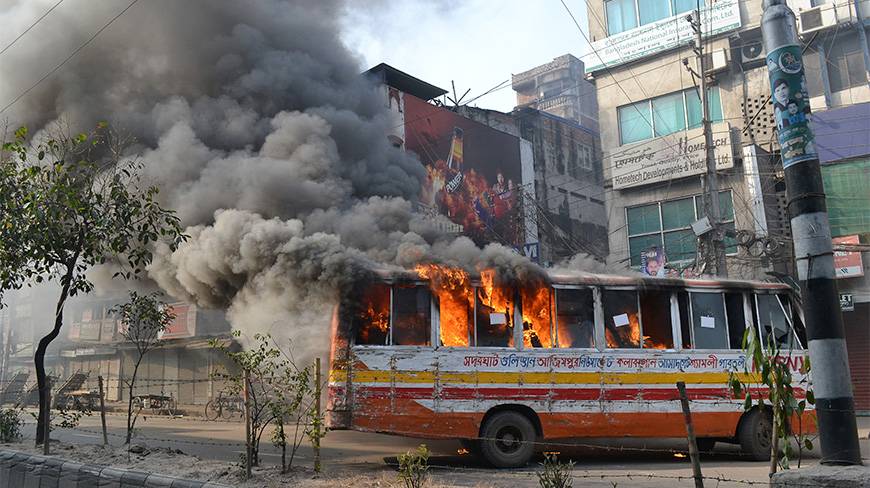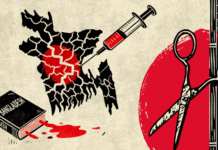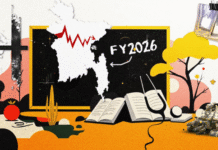Let us dispense with the notion that any of our four major political parties are democratic, notwithstanding the fond remembrances of non-existing history by their apologists in the media and intelligentsia. Never in the history of the Bengali people, going back to the first partisan legislative elections in 1937, has a party been “democratic” when in office.
Short term solutions every five years at election time are not going to fix a problem that is so deeply embedded in our political culture. If there is a failing that the international community has vis-à-vis Bangladesh, it is that our friends intervene only to fix the symptoms every few years rather than help fix things more permanently.
Having a neutral government or fair election is good, but such band-aids do not address the deeply ingrained realities on the ground that have been unchanged since day one of the republic, except for those two occasions in 1990 and 2007 when no-nonsense non-partisan governments (for all their faults) actually upheld the fundamental constitutional idea that the law be applied to all, irrespective of party.
The fact of the matter, which is plain to everyone except committed apologists of old style politics, is that this government has broken every one of its pledges when it came to establishing the independence of the lower judiciary or statutory bodies; to add insult to injury, the current manifesto of the ruling party makes the same promises again.
How different today is from 1990 and 2007. Every institution of the state, from the Election Commission to the Road Transport Authority to the lower judiciary to the capital’s police, is no more than a pathetic, grovelling, subservient appendage of the ruling party.
It is obvious that in Bangladesh, the law of the land does not apply to those affiliated with the ruling party, while at the same time, arbitrary extra-legal measures are generously used to subdue and harass those who dissent. Why else would the leader of the opposition in parliament have her home surrounded by hundreds of shock troops who prevent her from leaving or others from entering while the police chief, almost comically, claims that there is no house arrest?
The long term solution lies not in merely having a free election so a different set of “democratic” tyrants can simply exact retribution, but rather in major constitutional changes that can go beyond the greedy impulses of temporary majorities in parliament. The impasse today is horrible, but if the will is there, it can be used to our benefit, should Bangladesh’s civil society and influential development partners pledge to utilise it for a more lasting answer to the perennial problem of free elections.
For starters, the original 1972 constitution’s separation of powers guarantees are restored vis-à-vis Articles 115 and 116 dealing with judicial independence, and such changes are further augmented by incorporating the conveniently (for the ruling party) lapsed Judicial Service Ordinance of 2008 into the body of the constitution itself.
Secondly, the original Anti-Corruption Commission law should be coupled with the long-ignored constitutional requirement of a national ombudsman. Thirdly, constitutional protections should be afforded to a new national police commission and reformed National Human Rights Commission and Election Commission, so that all three are appointed by a formula where the government, the parliamentary opposition, and the higher judiciary all have substantive input, and the positions themselves are staggered so that there is no wholesale turnover every time a government changes.
Finally, the entire constitutional reform package must be protected from the well proven capriciousness of professional politicians by adding a provision that disallows changes to the package, unless such changes are approved by a two-thirds majority of a parliament elected under its provisions and ratified in a national referendum, notwithstanding existing amendment procedures in the constitution.
This once-every-five-years-teeth-gnashing is a perennial problem which requires a solution that is both long-lasting and appropriate, given our sorry history of using democracy for undemocratic ends. Should the parties not agree to making such deep, long-lasting, organic changes to the broken constitutional system, the world should take note and act accordingly.
As much as it pains me to admit it, history bears witness that the only time Bangladesh’s political parties negotiate in good faith is when development partners and export markets finally decide that enough is enough.
Foreign interference? You bet it is. But nothing else has worked to protect the interest of ordinary Bangladeshis from the limitless lust for absolute power that all these “democratic” parties possess. If the international community truly wants to help Bangladesh, it is time to go beyond band-aids and adopt a real cure to what ails a political culture that is anything but democratic.
The truth of the matter is that Bangladesh is no real democracy except in the minds of those who hold state power at any given mo ment, or those whose livelihoods depend on continuously propagating that falsehood on the basis of myths. Mere elections are not going to change that scheme of things; only long-term, deeply embedded, structural changes that put fetters on the proven capriciousness of professional politicians can have a shot at snatching a sustainable, pluralist, representative democracy from the jaws of the elected absolutist tyranny that Bangladesh has been since 1990.
As John Adams, America’s second president, so memorably said in the early years of his own new republic (that was born of a war of independence, not unlike that of Bangladesh’s own freedom struggle): “Their vanity, pride, resentment, or revenge must be mitigated and controlled as much as possible.” President Adams was referring to the necessity of constitutional provisions to check the very primal nature of politicians to desire absolute power.
Source: Dhaka Tribune










